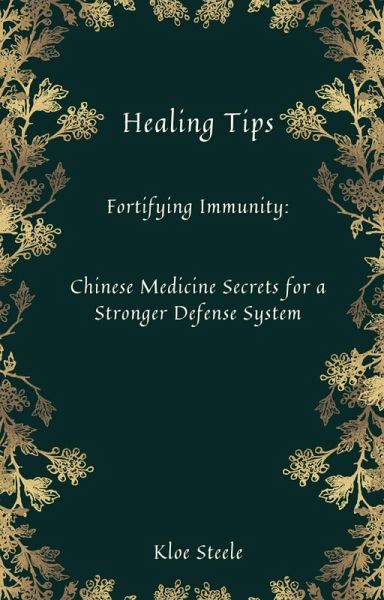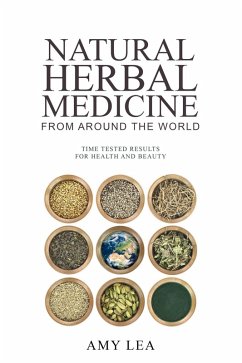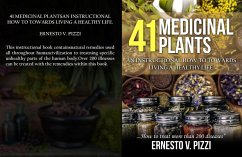
Healing Tips-Fortifying Immunity: Chinese Medicine Secrets for a Stronger Defense System (eBook, ePUB)

PAYBACK Punkte
0 °P sammeln!
Chinese medicine, with its roots in ancient wisdom and holistic healing, has had a profound impact on promoting natural health and well-being. The system encompasses various practices, including acupuncture, herbal medicine, tai chi, qigong, and dietary therapy. Here are some aspects of Chinese medicine that highlight its amazing impact on natural healing:Holistic Approach: Chinese medicine views the body as a holistic system where the balance of vital energy (Qi) and the harmonious flow of Yin and Yang are crucial for health. This holistic perspective encourages addressing the root cause of a...
Chinese medicine, with its roots in ancient wisdom and holistic healing, has had a profound impact on promoting natural health and well-being. The system encompasses various practices, including acupuncture, herbal medicine, tai chi, qigong, and dietary therapy. Here are some aspects of Chinese medicine that highlight its amazing impact on natural healing:
Holistic Approach: Chinese medicine views the body as a holistic system where the balance of vital energy (Qi) and the harmonious flow of Yin and Yang are crucial for health. This holistic perspective encourages addressing the root cause of ailments rather than merely treating symptoms.
Acupuncture: This ancient practice involves inserting thin needles into specific points on the body to stimulate energy flow and restore balance. Acupuncture has been found effective in managing various conditions such as pain, stress, insomnia, and digestive issues.
Herbal Medicine: Chinese herbal remedies, often composed of plant roots, leaves, and other natural substances, are prescribed based on an individual's specific constitution and health condition. These remedies aim to restore balance and address the underlying imbalances causing illness.
Tai Chi and Qigong: These mind-body practices involve slow, flowing movements, breath control, and meditation. Regular practice of tai chi and qigong has been associated with improved balance, reduced stress, and enhanced overall well-being.
Dietary Therapy: Chinese medicine emphasizes the importance of proper nutrition for maintaining health. Specific foods are recommended or avoided based on their energetic properties, and dietary adjustments are often suggested to address imbalances and promote healing.
Preventive Care: Chinese medicine places a strong emphasis on preventive care and maintaining balance in the body to prevent illness. Practices like acupuncture and herbal medicine are often used proactively to enhance overall health and resilience.
Personalized Treatment: Chinese medicine recognizes the uniqueness of each individual and tailors treatments to suit the specific needs of the person. This personalized approach is in stark contrast to the one-size-fits-all model often seen in Western medicine.
While Western medicine has made significant strides in various areas, the holistic and individualized approach of Chinese medicine provides valuable insights and alternative options for those seeking natural and traditional methods of healing. Integrating the best of both worlds can offer a comprehensive approach to healthcare, promoting overall well-being and addressing the complexities of modern health challenges.
Holistic Approach: Chinese medicine views the body as a holistic system where the balance of vital energy (Qi) and the harmonious flow of Yin and Yang are crucial for health. This holistic perspective encourages addressing the root cause of ailments rather than merely treating symptoms.
Acupuncture: This ancient practice involves inserting thin needles into specific points on the body to stimulate energy flow and restore balance. Acupuncture has been found effective in managing various conditions such as pain, stress, insomnia, and digestive issues.
Herbal Medicine: Chinese herbal remedies, often composed of plant roots, leaves, and other natural substances, are prescribed based on an individual's specific constitution and health condition. These remedies aim to restore balance and address the underlying imbalances causing illness.
Tai Chi and Qigong: These mind-body practices involve slow, flowing movements, breath control, and meditation. Regular practice of tai chi and qigong has been associated with improved balance, reduced stress, and enhanced overall well-being.
Dietary Therapy: Chinese medicine emphasizes the importance of proper nutrition for maintaining health. Specific foods are recommended or avoided based on their energetic properties, and dietary adjustments are often suggested to address imbalances and promote healing.
Preventive Care: Chinese medicine places a strong emphasis on preventive care and maintaining balance in the body to prevent illness. Practices like acupuncture and herbal medicine are often used proactively to enhance overall health and resilience.
Personalized Treatment: Chinese medicine recognizes the uniqueness of each individual and tailors treatments to suit the specific needs of the person. This personalized approach is in stark contrast to the one-size-fits-all model often seen in Western medicine.
While Western medicine has made significant strides in various areas, the holistic and individualized approach of Chinese medicine provides valuable insights and alternative options for those seeking natural and traditional methods of healing. Integrating the best of both worlds can offer a comprehensive approach to healthcare, promoting overall well-being and addressing the complexities of modern health challenges.
Dieser Download kann aus rechtlichen Gründen nur mit Rechnungsadresse in A, B, CY, CZ, D, DK, EW, E, FIN, F, GR, H, IRL, I, LT, L, LR, M, NL, PL, P, R, S, SLO, SK ausgeliefert werden.













